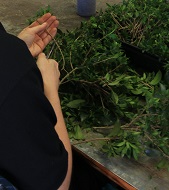Learn to Manage a Production Nursery
- Professional Development for Nurserymen and Horticulturists
- Self paced, online studies
- Better manage the plant development on site, from start to finish

Course Structure
Eight lessons:
1. Nursery Site Organisation
Learn how nurseries are established, or what to understand about buying an established nursery. Understand establishing a new site, site planning, estimating space requirements.
2. Management
Government and commercial nurseries, partnerships, companies, sole proprietorship, developing a management structure, labour relations and seasonal staff, work programs and production timing.
3. Nutrition and Pest Management
Field crops, container plants, principles of fertiliser use and plant nutrition.
4. Growing Media
Soils and soil-free mixes, rockwool, sterilisation, techniques.
5. Irrigation
Methods and equipment, estimation of water requirements and use of liquid fertilisers through irrigation.
6. Modifying Plant Growth
Modification techniques, flower forcing and quality control.
7. Marketing Strategies
Exploiting existing markets, developing new markets, advertising, product presentation, pricing, plant recycling.
8. Selection of Nursery Crops
Developing a stock list, operational flow charts, market surveys.
Course Duration : 100 hours
Nurseries Come in All Shapes and Sizes
Throughout the world, nurseries come in all types and sizes. Many are very small family businesses, sometimes just as a small hobby business to supplement the families normal source of income. At the other end of the scale are large commercial businesses or government department nurseries which employ dozens of people and grow millions of plants. No matter what size though, a nursery always needs good management if it is to be financially viable. This book aims to show you ways to make a difference to the financial viability, hence the success, of any nursery, irrespective of size or type.
TYPES OF NURSERY
In the past, nurseries very often did just about everything to do with the production and culture of plants. They grew a wide variety of plants, and they sold them both wholesale and retail, as well as often supplying a whole range of allied products and services. Today all but the largest nurseries tend to specialize. Nurseries can be classified in many different ways. For example:
According to what they grow - such as natives, exotics, seedlings, cottage garden plants, bonsai or bulbs.
How they grow it - such as inground or in containers.
Even the size of plants they produce - such as tubestock, small pots/containers, or advanced (in-ground or in containers).
Nurseries which try to do everything rarely succeed. New nurseries should consider the following options carefully and define the scope of their operation to fit their resources, skills and knowledge.
Produce, Grow On or Sell?
There are three main types of nurseries; production, growing on and retail. Production nurseries propagate plants and wholesale them to growing on nurseries, or directly to retail nurseries, or as tubestock (sometimes larger sizes) for mass planting perhaps in forestry or parks. Growing on nurseries buy small plants, pot them up or plant them out, then grow them on to a larger size, adding value to their original purchase. Retail nurseries buy plants off production or propagation nurseries, then resell them at a profit. In many cases nurseries will be a combination of two, sometimes all three, types.
Organizational Structure
Nurseries can be non-private (e.g. government or community groups, conservation groups) or private businesses. Private nurseries can be individually owned, partnerships (perhaps owned by a husband and wife or two friends), or corporate, such as a company, where they have a legal identity of their own.